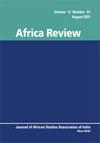LGBT individuals and the struggle against Robert Mugabe's extirpation in Zimbabwe
IF 0.5
Q4 AREA STUDIES
引用次数: 10
Abstract
ABSTRACT Queer identities and non-heteronormative sexualities are increasingly becoming visible globally and Zimbabwe has witnessed an emergent queer mobilization and sexual identities politics. There have been significant attempts to expunge non-heterosexuals from Zimbabwean citizenry by drawing borders on the basis of sexual orientation. Over the years, western and local media have mediated a narrative of a thoroughly homophobic Zimbabwe, not the least emanating from the former president, Robert Mugabe's homophobic utterances which recurrently generated global news stories. A dominant discourse framed homosexual identities as on or beyond the border of what is socially acceptable, whilst the individuals with queer identities have been denied legal protection and status. Predominantly, homophobic sentiments are expressed, often reflecting the view that homosexual identities should not be given space in Zimbabwe, nor should anything associated with it be tolerated. The populist arguments are based on among other things, depicting heterosexuality as ‘natural’, homosexuality as ‘uncultural’ and ‘unChristian’, and stereotyping gay people as licentious. Drawing on ethnographic research, this paper explores how LGBT people in Harare perceive, make sense of and cope with the infamous hate speech, ‘worse than dogs and pigs’, by the former president and the implications of this on their self-perception as they defiantly express a narrative of self-affirmation challenging the marginal status in popularized discourse.在津巴布韦,同性恋者和反对罗伯特·穆加贝下台的斗争
酷儿身份和非异性恋性行为在全球越来越明显,津巴布韦见证了新兴的酷儿动员和性身份政治。津巴布韦曾有过一些重大尝试,通过根据性取向划定边界,将非异性恋者从公民身份中抹去。多年来,西方和当地媒体一直在宣传津巴布韦是一个彻底的恐同国家,尤其是前总统罗伯特·穆加贝(Robert Mugabe)的恐同言论,这些言论经常引发全球新闻报道。主流话语将同性恋身份框定在社会可接受的范围之内或之外,而具有酷儿身份的个人却被剥夺了法律保护和地位。主要表达的是恐同情绪,通常反映出同性恋身份在津巴布韦不应该被给予空间,也不应该容忍任何与之相关的东西。民粹主义的论点是基于其他方面,将异性恋描述为“自然的”,同性恋描述为“非文化的”和“非基督教的”,并将同性恋者刻板印象为放荡。通过民族志研究,本文探讨了哈拉雷的LGBT人群如何感知、理解和应对前总统臭名昭著的“比狗和猪更糟糕”的仇恨言论,以及这对他们自我认知的影响,因为他们挑衅地表达了一种自我肯定的叙事,挑战了大众话语中的边缘地位。
本文章由计算机程序翻译,如有差异,请以英文原文为准。
求助全文
约1分钟内获得全文
求助全文
来源期刊

Africa Review
AREA STUDIES-
CiteScore
1.80
自引率
12.50%
发文量
22
期刊介绍:
Africa Review is an interdisciplinary academic journal of the African Studies Association of India (ASA India) and focuses on theoretical, historical, literary and developmental enquiries related to African affairs. The central aim of the journal is to promote a scholarly understanding of developments and change in Africa, publishing both original scholarship on developments in individual countries as well as comparative analyses examining the wider region. The journal serves the full spectrum of social science disciplinary communities, including anthropology, archaeology, history, law, sociology, demography, development studies, economics, education, gender studies, industrial relations, literature, politics and urban studies.
 求助内容:
求助内容: 应助结果提醒方式:
应助结果提醒方式:


